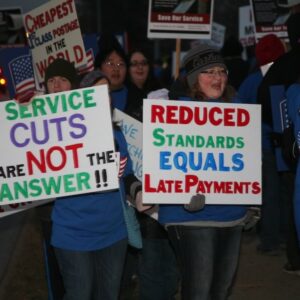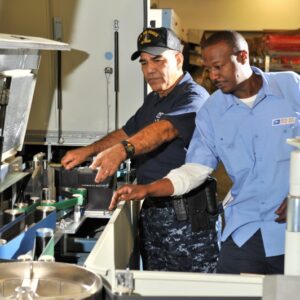November 1, 2015
Lessons of a $56 Million Settlement
(This article first appeared in the November/December 2015 issue of The American Postal Worker magazine.)
At the end of the summer, the clerk division announced the criteria for distributing the $56 million monetary portion of the settlement that resolved a decades-long dispute over postmasters and supervisors in small offices performing Clerk Craft work.
The Dec. 5, 2014, settlement, which is the biggest monetary awards in the union’s history, established a much simpler method for addressing such infractions in the future. We hope and expect that this will drastically reduce incidences of postmasters and supervisors performing Clerk Craft work.
Distribution Method
- Approximately 13,465 employees in Level 15, 16, and 18 offices who were on the rolls as Part-Time Flexibles (PTFs) or who occupied Non-Traditional Full-Time (NTFT) assignments will be paid on a “share basis” for the period from May 7, 2011, to Dec. 5, 2014.
- Each week that a PTF or employee in a NTFT assignment was on the rolls during that time frame will count as one share.
- A total of 187 possible shares correspond to the 187 weeks in the time frame. Each share is valued at approximately $26.23.
- A PTF employee or an employee occupying a NTFT assignment who was on the rolls for the entire period will receive approximately $4,900.
- The initial disbursement will total $44.8 million, with the remaining 20 percent to be held in reserve as a backup for overlooked employees and other considerations.
- The second disbursement of $11.2 million is expected to take place about six to nine months after the initial disbursement has been completed.
PTFs and employees in NTFT assignments were identified to receive the financial portion of the remedy because these two groups were not guaranteed 40 hours per week and lost income as a result of the violations. As a group, they will receive less than the loss they collectively experienced. It is important to note that in accordance with the PTF Hub Memo, PTFs outside an installation could have been utilized prior to the use of overtime.
Deciding on the distribution method was extremely difficult. Once it became clear that there were far too many variables to tie the remedy to specific grievances and/or individuals, we concluded that the “share method” was the fairest way to handle disbursement. Many thanks go to local and state leaders and Clerk Craft National Business Agents (NBAs) for their input into the decision-making process. Special thanks are due to NBAs Bob Kessler, Billy Woods and Willie Mellen for providing insightful counsel, and to Mike Barrett of the Buffalo NY Local, who sifted through the data provided by the USPS and prepared it for analysis by the group.
In addition to designating a $56 million payment, the “Global Settlement” created a far simpler method for resolving subsequent violations of this type. Union representatives no longer need to spend hours trying to build a case for each office where there is a violation.
As a result, the settlement is continuing to provide monetary remedies beyond the $56 million. Between December 2014, when the settlement was reached, and September 2015, the USPS paid over $22 million to employees because of postmasters/supervisors performing craft work in violation of the contract.
Positive Impact In the Community
The violations arose in large part because the Postal Service was understaffing post offices. As a result of the union’s actions, management has hired more than 1,000 additional career employees.
On this one issue, our union is directly responsible for significantly improving the lives of over 1,000 families. Every new postal job provides a breadwinner with a good-paying union job with medical coverage and retirement benefits. This gives an entire family a brighter future.
Many corporate business owners claim they are the “job creators” to win public support. But what kinds of jobs are they creating? Many pay close to minimum wage and offer few benefits. Sometimes the pay is so low that employees are eligible for government assistance, such as medical care, food stamps, free or reduced school lunches, etc. On the other hand, we are creating jobs that a worker can raise a family on.
The additions to the workforce also reduce the stress on employees who were working in understaffed offices and improve service. Through collective action, the union is generating jobs and better service for our communities.
Looking to the Future
It took a long time to get where we are today. The Postal Service stalled and put up numerous obstacles.
The $56 million, the new jobs and the improved service are a result of the collective effort of officers in previous union administrations, current officers, and the many representatives and union members through the years who provided the foundation for the settlement. It would not have been possible without a sustained, collective effort.
Historically, these contract violations were difficult to prove. But as good as the settlement was, it could have been better. There are some important areas that we have to improve upon in the future.
Educating the Public – The Postal Service, large mailers, and corporate media often portray the USPS as broke in order to advance their agenda. Unfortunately, arbitrators often believe the spin, which affects their rulings. Many arbitrators sustain grievances, but provide no monetary award. Unless we counter the myth that the Postal Service is financially unstable, we will continue to have a huge disadvantage in negotiating a contract and settling grievances.
Grievance Tracking – Another area that needs improvement is tracking grievances. We need to be able to calculate the financial worth of each grievance and to identify the appropriate recipient of financial awards.
PTF Conversion to Full-Time – It is important to convert the new career PTFs to full time by counting the PTF hours and creating desirable duty assignments.
We would like to give a final word of appreciation to everyone who contributed to this significant settlement. If we learn our lessons from this settlement and build our power, we can win even greater victories in the future.


